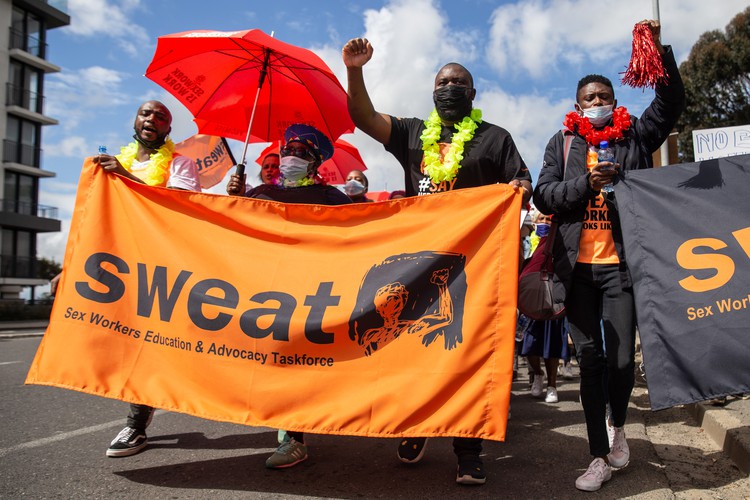
6 December 2022
Activists from the Sex Workers Education and Advocacy Taskforce (SWEAT) at a march for sex workers’ rights in September 2021. Archive photo: Ashraf Hendricks
Last week, Cabinet announced that a bill to decriminalise sex work would be published for public comment. If brought into law, the Criminal Law (Sexual Offences and Related Matters) Amendment Bill of 2022 would decriminalise “the sale and purchase of adult sexual services” by repealing Section 11 of the Criminal Law (Sexual Offenses and Related Matters) Amendment Act, 2007.
GroundUp spoke to sex workers about the possible decriminalisation of their livelihood, and how it would affect their lives.
“We have been advocating decriminalisation for over two decades,” said Constance Mathe, a sex worker and national coordinator of the Asijiki Coalition, which advocates for sex work’s decriminalisation. “The issue doesn’t affect the sex workers alone but society as a whole.”
In October 2002, the Constitutional Court delivered its decision in Jordan v State, which found that the state was entitled to criminalise sex work. This was a split decision, with five of the eleven justices putting their names to a dissenting opinion in favour of decriminalisation. The effect of this ruling was to place the responsibility for decriminalising sex work in Parliament’s hands.
Since then, sex workers and human rights groups have campaigned to have parliament repeal laws that criminalise sex work. For Mathe, like many sex workers, decriminalisation is a life-or-death issue.
“I am very happy because as a sex worker, I was living my in fear for my life. I am a target to the police, I am a target to the society. I am rejected by the family and discriminated against by everyone. But now if my work is being recognised by the government, I can gain constitutional rights,” said Mathe.
“This decriminalisation bill we are calling for will benefit the new generation too. Sex work is an old profession that will never fade. Many sex workers have died and this bill will save many lives.”
Joanna*, 38, has been a sex worker for 17 years and is a member of the Sex Workers Education and Advocacy Taskforce (SWEAT). She says discrimination against sex workers is a big challenge.
“The bill means a lot to us,” she said. “We have criminal records against our names. Even if I think of quitting [sex work], my criminal record can’t be erased. As sex workers, the bill will allow us to gain our freedom.”
Joanna wants the government to go beyond decriminalisation and for the sex industry to be recognised by the Department of Employment and Labour.
“During Covid, people got Unemployment Insurance Fund money but because sex work is not registered we couldn’t get any money. The government didn’t think about how we were going to get food and survive with our children. No one cared about us. We believe that if people comment positively it will assist us to have sex work decriminalised and recognised like all other workers.”
Joanna told GroundUp that the current laws give police room to abuse their powers.
“When you run to the police officer to seek help, they ask for sexual favours or bribery money. The money you have been working for the whole night to feed your family and children, they take it away … Because we are scared to be arrested we end up doing whatever they ask us to do. They force us to sleep with them without protection. We are used to rape and we just let them as long as our lives are safe.”
Tracy*, 32, is a member of Sisonke, a national sex workers’ movement, and has been a sex worker for six years. She supports her siblings who are at university and her three children who live in KwaZulu-Natal. Tracy says that if the bill becomes law, she will be able to work freely.
“I will be able to report if a client violates me or refuses to pay for the service. The bill would change my life for better, eliminating stigma and discrimination. Police will stop harassing us and the people buying sex from us. We would now have power to go and report them and get justice.”
Tracy also told GroundUp that the criminalisation of sex work puts her at risk of mistreatment by the police. “Police arrest us and demand too much money from us so that they don’t lock us in cells. Sometimes police demand free sex, beat and pepper spray us … I have slept in the cells four times at the police station. They say you stay until the weekend is finished. If you don’t give them money you stay in cells for a long time … They don’t give receipts for the money you pay. They also arrest us for not carrying our IDs.”
SWEAT spokesperson Megan Lessing said, “We are hoping that when the bill goes through the parliamentary process, a moratorium will be placed on the way sex work is policed, the arbitrary arrests, fines and the subsequent violations, like extortion, physical and sexual violence.”
*Names changed to preserve anonymity.